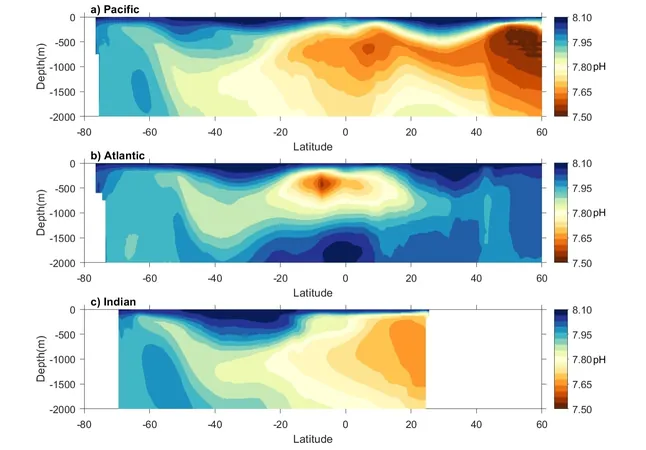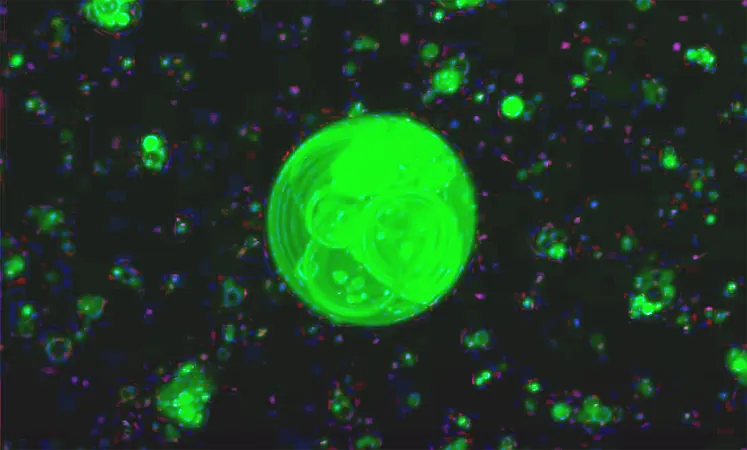
Breakthrough in Understanding Ocean Acidification: Researchers Unveil Global 3D Dataset of Seawater pH
2025-03-27
Author: Wei Ling
Breakthrough in Understanding Ocean Acidification
In a significant advancement for marine science, researchers have developed a comprehensive global 3D dataset of seawater pH, addressing the urgent threat of ocean acidification caused by the rising levels of atmospheric CO₂. This groundbreaking work is pivotal for assessing the impacts on marine ecosystems and biodiversity amidst ongoing climate change.
Understanding Oceanic Acidification
Oceanic acidification, a phenomenon resulting from the oceans' absorption of CO₂, has the potential to disrupt various biological processes and threaten the survival of numerous marine species. However, studying this crucial issue has been hampered by limited observations of seawater pH and inconsistent data collection, especially in the deeper layers of the ocean.
Methodology Used by Researchers
To tackle these challenges, a dedicated team from the Institute of Oceanology of the Chinese Academy of Sciences (IOCAS) employed a Stepwise Feed-Forward Neural Network (Stepwise FFNN) algorithm. This innovative tool allowed them to determine the most effective predictors for reconstructing seawater pH with minimal errors. They complemented their algorithm with observational data from the Global Ocean Data Analysis Project (GLODAP), resulting in a globally accessible monthly 3D dataset covering the past 30 years.
Significance of the Dataset
Dr. Zhong Guorong, the principal author of the study published in Earth System Science Data, emphasized the significance of their dataset, stating, “Our 3D gridded pH dataset extends to a depth of 2,000 meters, enhancing both accuracy and reliability.
Categorization and Data Accuracy
The researchers further categorized the global ocean into distinct biogeochemical provinces based on various pH drivers, optimizing the selection of environmental variables and thereby improving data accuracy. Additionally, they implemented cross-boundary optimal interpolation technology, a method that has significantly enhanced the accuracy of marine chemical parameter reconstruction.
Ensuring Reliability through Validation
To ensure the dataset's reliability, the researchers utilized a rigorous cross-validation technique that mitigates the risk of model overfitting. This landmark dataset is now publicly available through the IOCAS Data Center, providing an invaluable resource for scientists and policymakers engaged in global climate modeling, marine conservation, and ecological restoration efforts.
Implications for Future Sustainability
As the world grapples with the implications of climate change, this robust dataset equips the scientific community with essential tools to monitor and respond to the urgent challenges posed by ocean acidification. With this information at hand, researchers and conservationists can better strategize efforts to protect our vulnerable ocean ecosystems and make informed decisions for future sustainability.


 Brasil (PT)
Brasil (PT)
 Canada (EN)
Canada (EN)
 Chile (ES)
Chile (ES)
 Česko (CS)
Česko (CS)
 대한민국 (KO)
대한민국 (KO)
 España (ES)
España (ES)
 France (FR)
France (FR)
 Hong Kong (EN)
Hong Kong (EN)
 Italia (IT)
Italia (IT)
 日本 (JA)
日本 (JA)
 Magyarország (HU)
Magyarország (HU)
 Norge (NO)
Norge (NO)
 Polska (PL)
Polska (PL)
 Schweiz (DE)
Schweiz (DE)
 Singapore (EN)
Singapore (EN)
 Sverige (SV)
Sverige (SV)
 Suomi (FI)
Suomi (FI)
 Türkiye (TR)
Türkiye (TR)
 الإمارات العربية المتحدة (AR)
الإمارات العربية المتحدة (AR)